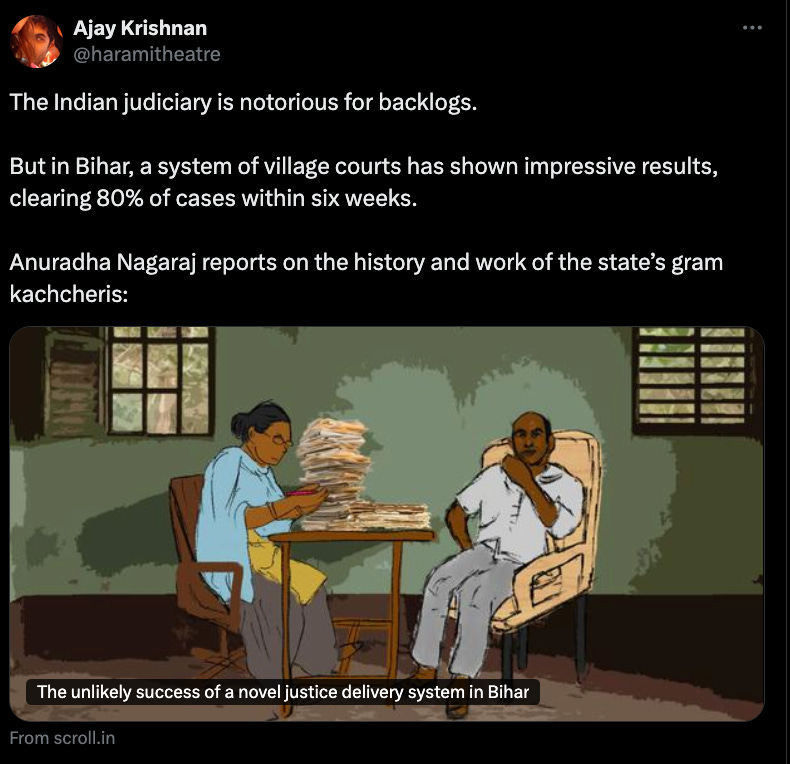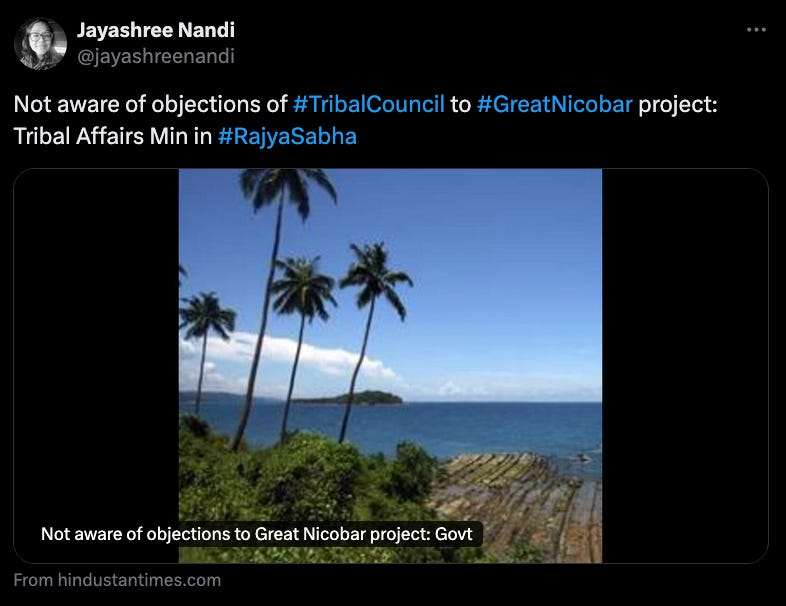What is the RBI Seeing? – Issue #125
Last week, the Reserve Bank of India (RBI) made an intriguing statement.
News of the Week
Last week, the Reserve Bank of India (RBI) made an intriguing statement.
Speaking at a seminar on climate change risks and finance, RBI Governor Sanjoy Malhotra said lenders should create a common pool of bankable green projects. “Lending to green projects is typically associated with higher credit risk due to borrowers’ use of new and emerging green technologies, which have relatively limited track record in terms of reliability, efficiency, and effectiveness,” wrote Economic Times, and quoted Malhotra as saying: “There is a need for collaboration in this emerging and evolving area. I urge the regulated entities to seriously consider setting up such a pool through an appropriate institutional arrangement."The timing for these remarks needs to be teased out. Under a new Governor, is the Reserve Bank taking climate risks more seriously? Or is the Bank seeing stress levels rise in India’s renewable energy sector — and wondering how to prevent a repeat in the future?
In other news, Indian refiners are pivoting from Russian oil to Latin American and African crude. US sanctions are one reason. In the coming months and years, this trend will get even more pronounced. Trump, fresh from declaring war on wind, now wants Drill, Baby, Drill. “US energy secretary Chris Wright has said the shale sector can deliver President Donald Trump’s pledge to “drill, baby, drill” even if prices fall to $50 a barrel,” reported the Financial Times.The jury is out on that. Shale is costlier to extract and so, in the past, has become competitive only when crude prices cross $70 a barrel. At this time, oilmen in the USA are a tad unconvinced about the government’s claims. “Andrew Gillick, a managing director at energy research group Enverus, said he was not sure the Trump administration fully appreciated what $50 a barrel oil would do to the US energy industry,” wrote FT. “Operators had most likely planned for prices to be over $70 this year, so at $50, rigs would likely drop and activity slow. And when the rigs drop in the Permian you lose the associated gas that the LNG industry is counting on at the end of the year,” he told the newspaper.What feels more incontrovertible, however, is that India will be buying more gas and oil from the USA. These purchases will bring questions about viability. Why are we buying shale oil and gas instead of sweet crude from the middle-east? Once more, Indian PSUs are cautious but the government is bullish. Tellurian redux.
In the meantime, is Indian refiners’ profitable sideline selling Russian crude to Europe coming to an end? If so, what does that mean for firms like Reliance which is, as things stand, facing heat in other businesses as well?
Yet other news. Heatwaves are hitting India sooner this year. NTPC has announced an eye-popping plan to invest as much as Rs 96,000 crore in Chhattisgarh’s RE sector — spanning pumped hydro, nuclear, wind, solar and hybrid projects. “The first memorandum of understanding (MoU) was signed between NTPC Ltd. and the Chhattisgarh government for setting up a 4,200 MW Nuclear Capacity in Chhattisgarh at an estimated investment of Rs 80,000 crore,” reported ET. In addition to this, Chhattisgarh has also signed MoUs for Rs 5,876 crore (1200 MW of pumped hydro) and Rs 10,000 crore for 2000 MW of RE projects. If these numbers are accurate, highly interesting conclusions about the future of India’s power sector follow. One MW of RE costs Rs 5 crore; one MW of pumped hydro is marginally cheaper at Rs 4.89 crore/MW; and at Rs 19 crore/MW, nuclear is four times as costly.
In other news, Andhra Pradesh has decided to buy 7,000 MW of RE power from Tata Power Renewable Energy Ltd for Rs 49,000 crore. The news is interesting on at least two counts. Late last year, Chandrababu Naidu’s government had assailed Jagan Mohan Reddy for buying 7,000 MW of power despite the state not needing so much electricity — and additionally having already exceeded its renewable power obligation, putting its grid at risk from variability of RE power. Now comes the news that Naidu is buying another 7,000 MW of RE power.
Two questions come to mind. One, can Andhra absorb all this RE power coming its way — there is also the Adani PPA, after all. Second, if the state wants to export this power, Chhattisgarh is cheaper at Rs 5 crore/MW. Andhra, on the other hand, is at Rs 7 crore/MW. Even Assam, despite getting lots of rain each year, has managed to source 5,000 MW from Tata at Rs 30,000 crore — or Rs 6 crore/MW.
Odd numbers from Andhra, in all. This needs a closer look.
While on numbers, here is one more. SJVN is investing Rs 9,500 crore to set up a 1,800 MW pumped storage project in Chhattisgarh — a rate of Rs 5.27 crore/MW. The firm made this announcement during the state’s Energy Investor Summit where firms announced a total of 300,000 crore in investments.
What were the other big trends last week?
The global tariff war continues to accelerate. The US threatened to slap a 200% tariff on European wines. It also imposed a 25% duty on all iron and aluminium imports and an additional 10 per cent levy on all Chinese products. Russia slapped tariffs on Chinese cars. For its part, China introduced retaliatory tariffs on US goods, including agricultural exports, targeting President Donald Trump’s rural base.
A new report, by thinktank InfluenceMap, said half of the world’s Co2 emissions comes from just 36 fossil fuel firms, with state-owned companies making up 16 of the top 20 emitters. “The top five state-owned emitters — Saudi Aramco, Coal India, CHN Energy, National Iranian Oil Company and Jinneng Group — accounted for nearly a fifth of all global emissions in 2023,” it said. In contrast, the top five investor-owned emitters — ExxonMobil, Chevron, Shell, TotalEnergies and BP — made up 5 per cent of emissions.
The subtext here is interesting. As the Guardian wrote, while many climate accountability cases worldwide are brought against investor-owned companies, state-owned companies, under direct control of nation states, are sued less often.
The Net-Zero Banking Alliance is in trouble. Many leading US banks have left it after Trump came to power. In response, as it tries to hold onto its flock, the top global climate alliance for banks will ask members, including HSBC and Barclays, to vote on ditching the pledge to align their $54tn in assets with a Paris agreement aim to limit global warming to 1.5C. This is one way to keep the rest of the flock together — given the flock is arguing it cannot decarbonise lending and deal books any faster than the wider economy.
“DR Congo — which has vast supplies of copper, cobalt and uranium — approached the US last month with a proposal for a deal that would offer exploration rights in exchange for support for the government of President Félix Tshisekedi,” reported FT. Neocolonialism continues? Tshisekedi has been struggling with armed conflict in the eastern part of the country, where M23 rebels backed by neighbouring Rwanda have captured swaths of mineral-rich territory and the two largest cities, Goma and Bukavu — and yet, these talks bring the Cold War to mind. Once more, strongmen are being propped up in return for access to Africa’s great mineral riches.
And, finally, there is bad news for NEOM, aka Saudi Arabia’s 170 kilometre long megacity. It’s missing its targets.
Biodiversity Outrage of the Week
Officials in Andaman and Nicobar converted turtle hatchlings’ release into the ocean into a photo-op, moving hatchlings from possibly Galathea Bay where the transhipment port is proposed) to another beach. Delays in release, however, can be harmful for the hatchlings.
Climate Change Interview of the Week
“People need to understand what is happening around the world. They need to realise that what is happening to someone else somewhere can happen to them, someday,” The Wire talks to climate researcher J. Srinivasan.
Climate Long-Reads
Reliance’s Vantara project made it to the headlines multiple times this week. First, after AltNews reported critical reports were dropping off the internet. Then, after Germany’s Sueddeutsche Zeitung published a large investigation into Vantara’s wildlife procurement. And then again after a sister report, from Venezuela’s Armando.info, examined wildlife transfers from its country to Vantara.
“In its most recent survey of national eating habits, Japan’s government discovered something unsettling. Adults in this wealthy, healthy country were now eating the smallest daily volume of vegetables since 2001. The reason? Inflation. At the beginning of March, prices of the three key ingredients of Japanese hotpot, a traditional winter dish — Chinese cabbage, leek and carrots — were respectively 227, 167 and 140 per cent above their long-term average.” Japan is struggling with inflation. (FT)
The massive failures of India’s drug regulatory system. Recurring exposés reveal massive gaps in drug safety in India’s pharma industry, as regulatory failures, lax laws, loopholes and lobbying leave millions in India, Southasia and the world at risk. (Himal)
Europe Enters Its Metal Era (Phenomenal World)
Climate-based mapping of a rare but emerging disease in Odisha. “A chance encounter between a microbiologist and a climate modelling scientist has led to the mapping of a neglected tropical disease across space and time in Odisha. The study used weather and land factors, namely, rain, temperature, humidity, sunlight, soil wetness, and soil temperature to map the occurrence of melioidosis, a rare but emerging tropical health concern that spreads through water and soil contaminated with the bacterium Burkholderia pseudomallei." This is a fascinating report from Mongabay India.
India’s Forgotten Country: How State Power & Capitalism Without Checks Fuel The Totalitarian Temptation (Article-14)
Books of the Week
We have terrible news. Richard Fortey has passed away. Each of his books — be it Trilobite!; Earth; Dry Store Room #1; The Wood For The Trees; or any of the others — was always a joyous, enlightening read. This newsletter heard the news about his passing and ordered his last book — a memoir called A Curious Boy. We are now waiting to clear time and space to read that.
In the meantime, here is a review. And here is an obituary for Fortey.








